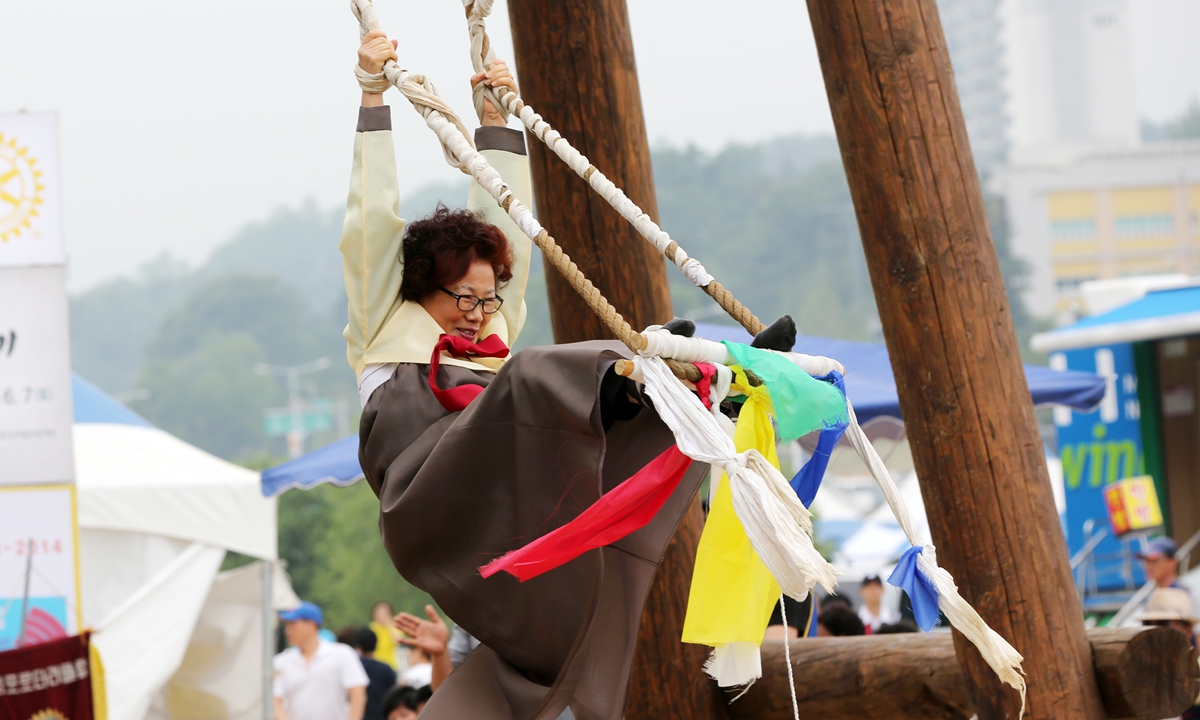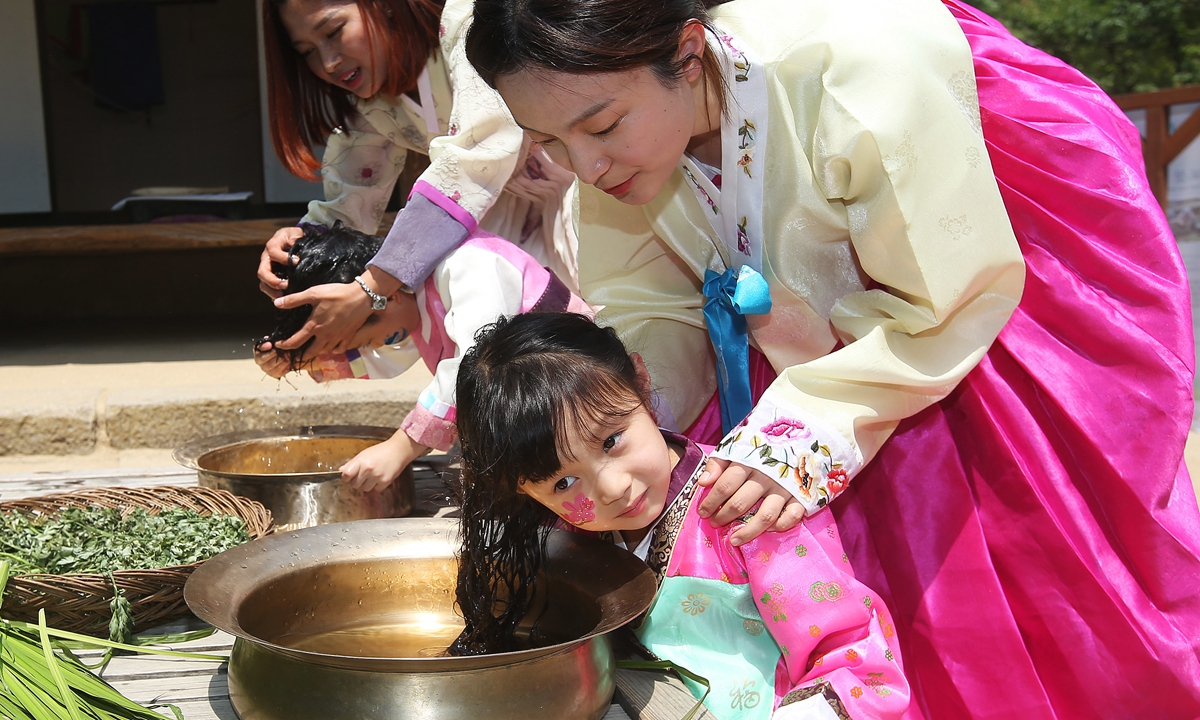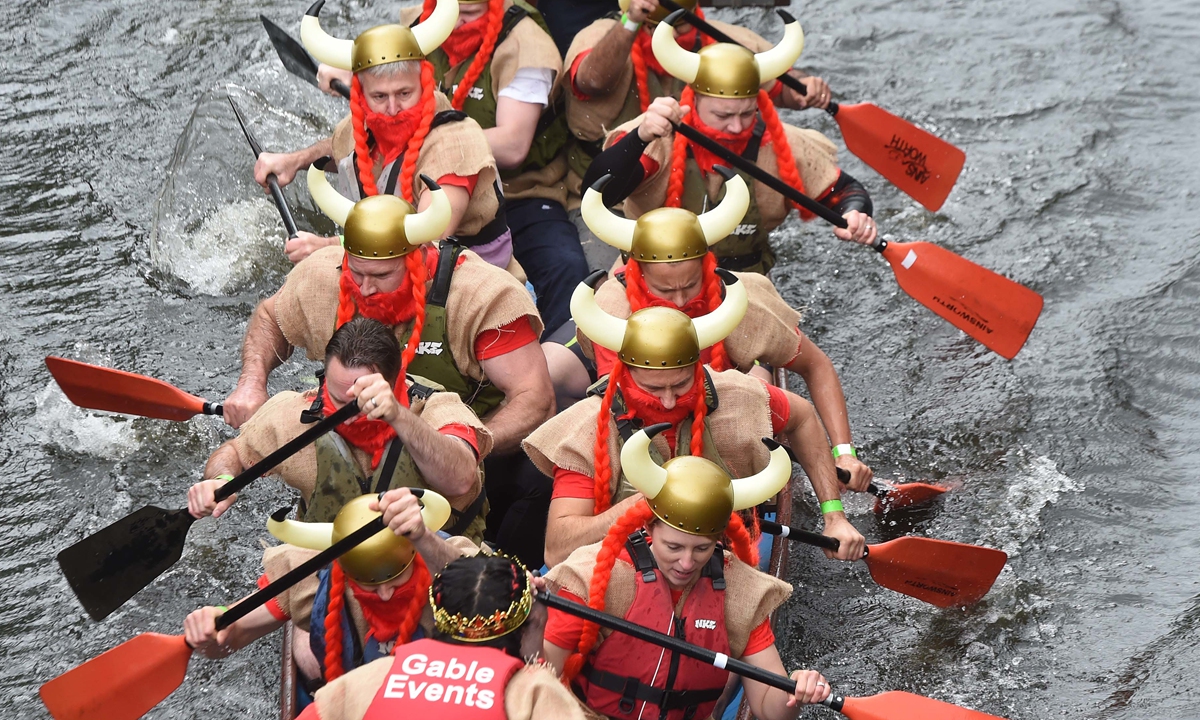ARTS / CULTURE & LEISURE
Influence of Dragon Boat Festival felt beyond

A woman plays on a swing during the Korean Dano festival. Photo: IC

A woman helps a girl rinse her hair with iris water at a Dano event in the Korean Folk Village in Yongin city, South Korea. Photo: IC

Teams take part in the Chinese Dragon Boat Festival on June 18, 2016. Left: A woman plays on a swing during the Korean Dano festival. Photo: IC
Editor's Note:The Dragon Boat Festival, also known as Double Fifth Festival because it falls on the fifth day of the fifth lunar month of the Chinese calendar, will arrive Friday. The festival is traditionally tied to prayers for eliminating illnesses and disasters, so the 2022 festival is especially anticipated amid the ongoing COVID-19 pandemic.
Although its English name just mentions the dragon boat, the festival's diverse customs also include eating traditional snacks and making pleasant smelling herb sachets, all of which are intangible cultural heritages with thousands of years of history. The influence of the festival has expanded to different countries such as the US and South Korea, showing the strong vitality of Chinese culture.
With the Dragon Boat Festival right around the corner, the first competition for the debut of the World Dragon Boat League is being held in Fuzhou, East China's Fujian Province from Wednesday to Friday.
It is estimated that about 70 teams, more than 1,500 people, will participate in the league. Dragon boat teams from different countries such as Russia and Pakistan will compete against local teams.
Dragon boat racing is very popular internationally. There are more than 50 million dragon boat fans around the world. Taking the UK as an example, there are more than 20 registered dragon boat teams in the UK, and dragon boat races are held in cities in the summer. In addition, there are also many dragon boat charity events in major European countries such as Germany and Italy.
Not only dragon boat racing, but also other customs related to the festival such as wearing herb sachets have been accepted by foreign cultures, a demonstration of the strong vitality of Chinese culture.
"A thousand years ago when the tradition of celebrating the Dragon Boat Festival entered neighboring nations such as Korea and Japan, the ways of celebration were adapted locally and became their own celebration. Originating from ancient China, this festival has now been exported to the Western world and has now been completely absorbed by local communities," Zhang Yiwu, professor of Chinese literature at Peking University, told the Global Times.
Influence in Asia
This festival originating in ancient China, widely believed to commemorate the death of the poet and minister Qu Yuan (340 BC-278 BC), has had great influence throughout the entire Asian cultural circle, including Japan, South Korea and Malaysia.
After spreading to these countries, the traditions of the Chinese festival changed according to the customs of local people. The Korean Dano festival on the fifth day of the fifth month of the lunar calendar is just such an example.
Koreans do not hold dragon boat races or eat zongzi during the festival, instead they eat wormwood cake, which is shaped like a wheel. The food made of wormwood represents the idea of getting rid of disease and bad luck, which is similar to Chinese people hanging wormwood on their doors. They also celebrate with sports like swinging and wrestling. Traditionally, women washed their hair in water boiled with sweet flag herb, which was believed to make one's hair shiny.
Other countries including Vietnam, Malaysia and Japan do eat zongzi though the shape of the snack has changed as well as the fillings inside in order to fit the tastes of local people. For example, Japan's zongzi, or chimaki, is more like a long cone than a pyramid.
Global expansion
From the second largest Chinese traditional celebration following the Spring Festival in the UK to becoming a demo sport at the Tokyo 2020 Olympic Games, the dragon boat racing's deep meaning and sporty competitive spirit presented in the races have accelerated its spread worldwide.
This exciting, competitive and inclusive team sport that can have mixed gender teams is "an activity that brings a festive spirit."
In 2018, before the pandemic, tens of thousands of spectators gathered along the bank of the Charles River in Boston in the US to witness a total of 75 teams compete in the 2017 Boston Dragon Boat Festival. In India right now, Kolkata is also getting ready for the festival, which will have a string of events including dragon boat races, lion dances and other cultural performances.
"Nowadays, the value of the festival is it can give modern people like us who live in the city an occasion to reconnect with nature and to taste the traditional food that our ancestors ate. Also, we take the day to pass on Qu Yuan's patriotic spirit to our children," Chen Qiuning, a Chinese folk culture expert in Wuhan, told the Global Times.
